Tenkara
It's not the simplicity of the gear that makes tenkara interesting, it's the complexity of what you can do with it.
Tenkara is the modern Japanese version of the earliest fly fishing. People have been fly fishing for thousands of years. And for thousands of years, a rod, a line and a fly were all they had.
The fly reel is a relatively modern invention, and it offers a significant advantage - holding extra line so a fisherman can make long casts and a hooked fish can make long runs. With every advance, though, something gets left behind.
In fly fishing, what got left behind was the ability to get drag-free drifts in tricky currents by keeping a light line off the water's surface. Well beyond just getting drag-free drifts, though, is the ability to control the path and action of the fly as it drifts, which you really can't do nearly as well if you have yards of fly line floating on the surface.
Also, the direct connection between the angler and the fish was lost when fish started pulling against the drag instead of the rod.
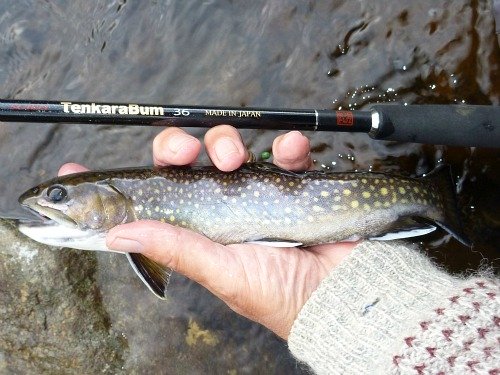 American Brook Trout or Japanese Iwana?
American Brook Trout or Japanese Iwana?In Japan, tenkara has been used for hundreds of years to fish in small, high gradient mountain streams. For small mountain streams, it really is an ideal way to fish. You don't make long casts and the fish don't make long runs, so you don't need a reel. There are cross currents everywhere and the long rod and light line make it much easier to get the precise drift you want or to keep a fly in an eddy. Because the line is off the water's surface, there is no need to mend. There is no excess fly line to get caught underfoot or get tangled in sticks and snags.
That lack of excess line to manage makes this the easiest way for a beginner to learn fly fishing. It is really pretty intuitive and a complete beginner can pick it up pretty quickly (without having to take expensive casting lessons).
In tenkara fishing, the whole emphasis is on the fishing rather than the fly choice; on presentation rather than imitation. Matching the hatch is not emphasized. Interestingly, in Europe, which has an even longer tradition of fishing with a long rod and line tied to the rod tip, flies have been tied to match specific insects for almost 2000 years.
I suspect the different approach to fly design is based largely on the waters that were fished. The high gradient mountain streams of Japan are not very fertile so the food supply is limited. The fish could not afford to be picky eaters. In more fertile streams, trout can at times be very selective.
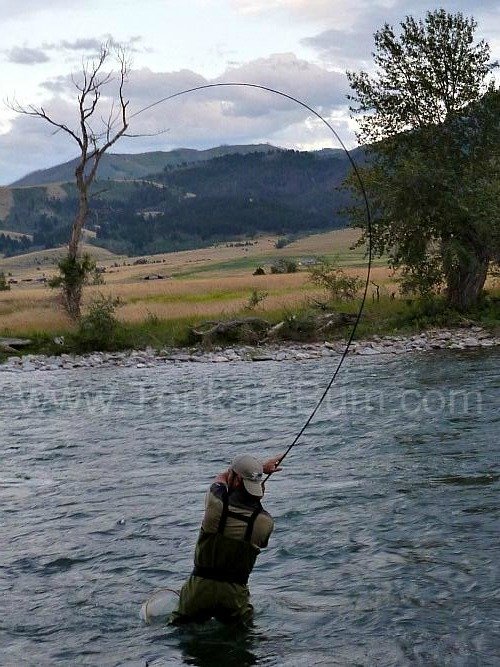 Supple rods protect light tippets.
Supple rods protect light tippets.The rods are long - most are roughly 10.5 to 14.5 feet. Despite their length, they are very light, ranging from under 2 ounces up to perhaps 4 ounces for the heaviest rods. They are also telescopic, and most collapse to between 15" and 24", depending on the model. That makes them very easy to transport - whether walking down the trail to the next pool or taking on the plane in your carry-on luggage. They are so supple that they can subdue larger fish than you would expect and still protect very light tippets.
The lines are usually from about the length of the rod up to perhaps 1.5 times the length of the rod (to which anglers add perhaps 3 to 5 feet of tippet). However, the lines are are very light - lighter than the lightest fly line. The long rod and light line allow you to keep almost all your line off the water, greatly reducing drag. Reduced drag yields better presentation, better presentations yield more fish.
And as good as the drifts are with the traditional wet flies, using a tenkara rod with a dry fly, which is done but not common in Japan, and relatively short line will give you better drifts than you have ever achieved (and more fish as well).
Tenkara in Japan, Tenkara in the US
On the whole, Japanese anglers use tenkara rods only for trout and only in mountain streams. Here in the US, just a few weeks after tenkara rods were first available, someone posted photos of some really impressive bluegills and largemouth bass that he'd caught with his new tenkara rod. From that day forward, people in the US have used tenkara rods to catch just about every fish that would take a fly and in just about any type of water - mountain streams, alpine lakes, warm water streams, farm ponds, the lake in the town park, wherever. One of the US tenkara companies even promotes salt water fishing (for bonefish, no less) with their tenkara rods. People have pushed the envelope in ways that would have been unimaginable in Japan.
 Central Park
Central Park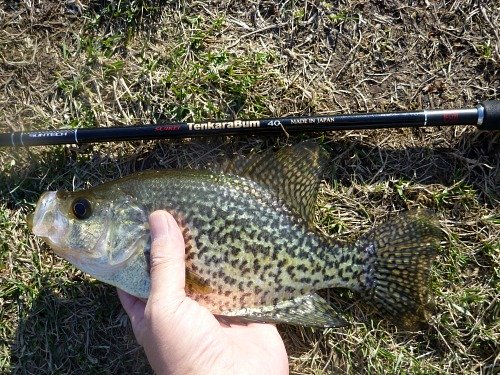 Central Park crappie.
Central Park crappie.To be sure, tenkara rods are not always the best tool. For carp fishing, there are carp rods. They look a lot like really long, really beefy tenkara rods, but they have the strength to battle carp. The situation is pretty much the same with salmon - there are fixed line rods designed specifically for salmon, and for big, hard-fighting fish they are truly a better choice.
For that matter, there are rods that are better than tenkara rods for fishing weighted nymphs, which is something nearly all American tenkara anglers do. Keiryu rods are used in Japan for bait fishing in mountain streams. Unlike tenkara rods, which are designed to fish unweighted flies, keiryu rods are designed to be fished with split shot. Whether the weight is a split shot or a bead head nymph, the physics are the same. Keiryu rods, in general, have firmer midsections, which makes it easier to get good hook sets when fishing with weighted flies.
Since the Japanese do not fish artificial flies with keiryu rods, they wouldn't call it keiryu fishing. However, since they don't fish weighted flies with tenkara rods, they wouldn't call it tenkara either. Similarly, since they don't use tenkara rods to fish for bluegills, or any other warm water species, they certainly wouldn't call that tenkara.
There are, of course, individuals who do not fit the mold. I have seen one (just one) photo of a Japanese angler holding a bluegill he had caught with a tenkara rod. Similarly, I have seen YouTube videos of a guy fishing with a tenkara rod for chubs, not in a mountain stream, and of a guy fishing with a tenkara rod in a salt water bay. I guess they didn't get the memo.
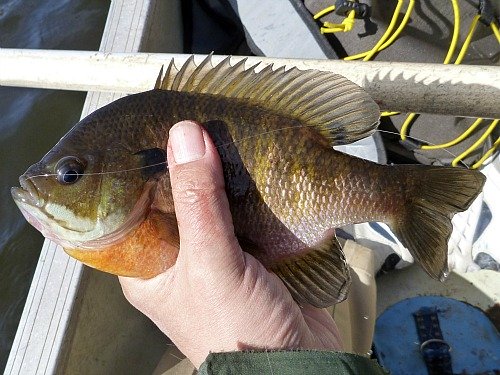 Bluegills are too much fun to ignore
Bluegills are too much fun to ignoreSo what does that all mean? I think what it means is that much of what we do here does not fit any of the Japanese definitions. I would suggest you not get too wrapped up in the definitions or the terminology used to describe a specific type of fishing that just isn't done in Japan. Not everyone in the US thinks that what we do here should be called tenkara. Not everyone in Japan thinks what we do here shouldn't be called tenkara.
After fishing with tenkara rods for over a decade now, fishing with Dr. Ishigaki on his 2009 trip to the Catskills, fishing in Japan, fishing with Tenkara no Oni at Oni Schools here in the US, taking a couple years concentrating on spinning and baitcasting to get the sister site Finesse-Fishing started, and then coming back to tenkara, I am coming more and more to the belief that tenkara is a fishing style, a method, not just a rod with the line tied to the rod tip.
To me, now, tenkara is fishing with a single unweighted (or perhaps very
lightly weighted) fly. I have come to agree that Euronymphing with a
tenkara rod is Euronymphing - not tenkara. Fishing panfish poppers is
fishing poppers, not tenkara. For some insight on how my views have changed, read my 10-14-17 trip report.
I have not gotten to the point, and I doubt I ever will, where I think tenkara is only for trout and only in mountain streams. I am certain that a Japanese master, fishing the Wisconsin Driftless area, would consider what he was doing to be tenkara - even though the stream he was fishing ran through a cow pasture. Some of the stream features are the same, the techniques are the same. I am not at all sure that what is behind him, out of sight, matters.
Besides, in Japan, even western fly fishing (fly rod, fly reel, fly line) is done only for trout and only in mountain streams! Are we to redefine "fly fishing?" Is it really a question of the proper definitions or is it more a question of geography and cultural differences?
Even though tenkara is often called simple, and it does not take long to learn how to cast a tenkara rod and catch a fish, there is a surprising amount of nuance in fishing a mountain stream. The moving water, in which the current speed and direction changes from one foot to the next, and in some cases almost from one inch to the next, makes each cast different. Utilizing the currents to get your fly to where you want it, manipulating the casting stroke so that the tippet aligns with the current, and manipulating the fly by twitching the rod to entice a fish to strike offers as much complexity as you could want.
You don't have to spend a lifetime studying tenkara. If you wanted to, though, you could. You truly could.
There is much to learn from the Japanese. Some of the masters have been
tenkara fishing for fifty years. There are techniques, honed over
decades, that can be learned only from the masters. There are blind alleys than can be avoided by taking advantage of the hundreds of years of trial and error that came before you.
However, there is also
much to learn on
your own. If you want to fish weighted nymphs or hoppers or panfish
poppers, you will not learn that from a tenkara master. The Japanese
tenkara masters don't fish that way. Increasingly, people would say that's not really tenkara - but if you enjoy it what does it matter? No point getting into an argument over definitions. Fish any way you want (as long as it's legal).
TenkaraBum.com
TenkaraBum.com has and will maintain a very open view of fishing in general, including fishing for fish that most people don't fish for and flies that most people don't use. You will find keiryu fishing, which in Japan is fishing mountain streams with bait. As with tenkara rods, though, people in the US do not limit their use of keiryu rods to mountain streams, or for that matter, to bait. A San Juan worm or an artificial nymph works just about as well as a real worm or a real nymph taken from under a rock in the stream.
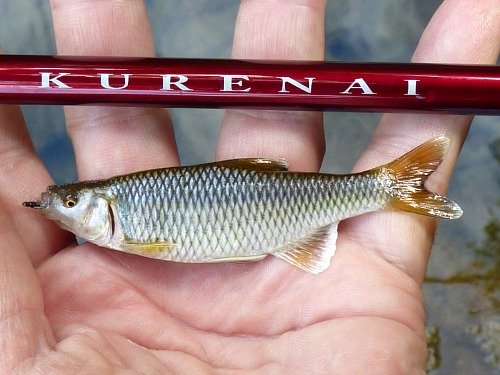 With the right rod, small fish are big fun.
With the right rod, small fish are big fun.On these pages you will find micro fishing, fishing for minnows, which is a lot of fun if you can let down your hair enough to try it.
You will also find fishing with bait. Open and unapologetic. Unlike so many American fly fishers, I do not look down on worm fishing or worm fishers.
All the rods currently sold here at TenkaraBum were produced by Japanese companies, designed by engineers and anglers who have been fishing and making tenkara rods and keiryu rods for decades. All are made in Japan. No other tenkara rod company in the US can say that. Experience matters. The technique is Japanese. Shouldn't your rod be?
More than a few people have asked me why I haven't written a
book. In a sense, I have and you are reading it now. I think you'll find that TenkaraBum.com has the
most complete coverage of Japanese fixed line fishing styles of any
English language site anywhere in the world.
You will also find that
the marketing effort is understated. There aren't slick videos and
there aren't many bloggers touting TenkaraBum rods. I don't have affiliates selling TenkaraBum gear for a commission. I don't have
discounts for bloggers, authors, guides, military personnel, veterans, seniors or volume. I am sure these are all
effective marketing strategies but in school I always hated marketing. From day one I have felt that the only way to be fair to everyone is to ask everyone to pay the same price.
I haven't done any glitzy Kickstarter campaigns to raise funds. I started small, tying a few flies and selling a few lines, and just grew as early customers became repeat customers, and as new customers found the site. Top quality products and top quality customer service pretty much speak for themselves.
I am winding down the shop, and there is less to buy than there used to be, but I intend to keep going.
One more thing, please keep in mind that this site is Tenkara Bum, not Tenkara Master.
Chris Stewart, Tenkara Bum
“The bitterness of poor quality remains long after the sweetness of low price is forgotten” - Benjamin Franklin
"Be sure in casting, that your fly fall first into the water, for if the line fall first, it scares or frightens the fish..." -
Col. Robert Venables 1662
As age slows my pace, I will become more like the heron.
We've all had situations where seriously chewed up flies kept catching fish after fish after fish. It is no sin to tie flies that come off the vise looking seriously chewed up.
Warning:
The hooks are sharp.
The coffee's hot.
The fish are slippery when wet.
Beware of the Dogma
All the hooks sold on TenkaraBum.com, whether packaged as loose hooks or incorporated into flies, are sharp - or as Daiichi says on their hook packages, Dangerously Sharp. Some have barbs, which make removal from skin, eyes or clothing difficult. Wear eye protection. Wear a broad-brimmed hat. If you fish with or around children, bend down all hook barbs and make sure the children wear eye protection and broad-brimmed hats. Be aware of your back cast so no one gets hooked.
Also, all the rods sold on TenkaraBum.com will conduct electricity. Do not, under any circumstances, fish during a thunder storm. Consider any fishing rod to be a lightning rod! Fishing rods can and do get hit by lightning!
Coming Soon
What's in stock?
Kurenai II AR 33F
Kurenai II AR 39F
Furaibo TF39
Furaibo TF39TA
Nissin Oni Tenkara Line
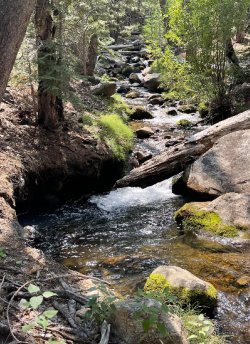
Thank you for your help and advice, Christopher. This kind of fishing mends my soul. That’s priceless.
Jonathan B, California
I had a crummy no name Tenkara rod to start. Purchasing excellent
rods from you made a dramatic difference in casting, fishing and overall
fun.
Thank you again.
Peter E, Minnesota
I wanted to send a note to say thank you!.....The rod arrived today, way earlier than I expected and I cant wait to use it ......thanks again for your speedy replies and great customer service!!! Any where I can leave a review for your store I definitely will.......hopefully the fish gods recognize your service and react accordingly........again top notch
Brian D, California
Thanks for the tip on fixing my bent lilian swivel, it worked! That's why I keep recommending you to my friends and you will keep my business. It would've been easier for you to sell me the parts and not advise me on how to fix.
John W, Kentucky
Many thanks for the great customer service that Chris provided when a recent order was mis-delivered prior to an upcoming fishing trip. Chris offered to ship a second product almost immediately, even if it meant mailing it to my vacation destination. Thankfully, the original order was located, but Chris' concern and willingness to help have gained another happy customer for Life. Thank you!
Jenny A, Colorado
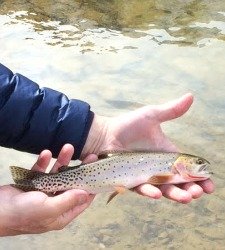
On the first cast I caught a nice Yellowstone Cutthroat! I was ecstatic. I have caught fish 8/10 times I have been out with my new Tenkara rod. Thanks.
Tracy H. Colorado
Just a quick note of thanks for the order. I picked up my rod today and it is simply stunning--I am so impressed with the quality, and my only regret is that I waited so long to order it.
Patrick O. Wyoming
Tenkara has me fishing water that in the past I would drive by on my way to the crowds. I am literally fishing waters that nobody wants to but are full of fish!
Alan J, Colorado
I just wanted to say thank you for the information on this site. I have never been fly fishing before. I bought the kids starter kit, thinking that if I liked it I could let my 8 year old have this one and get a rod for myself. I took the kids kit out to the creek today and caught 15 rainbow and golden trout! About half were caught on the killer bug you supplied, and the other on a wooly bugger another angler that I met today gave me. My 8 year old had a blast as well, obviously and has taken to it naturally. Needless to day I will be getting myself a rod soon.
Gabe L, Illinois
You really do have the most complete site for these styles… easily referenced and cataloged.
Michael E, Texas
Just wanted to thank you Chris again for the great site & tips you gave me. While I'm no Tenkara pro, I am nailing our finicky trout like never before. Such fine control over drift & depth without an indicator, I absolutely love it. I've passed your site along to friends.
Good fishing, & thanks again!
G B, Utah
I am writing simply to tell you how much I appreciate your incredible customer service. I have never experienced such a consistently high level of service from any person or business and it has definitely made an impression on me. You have a customer for life and I look forward to any excuse to buy more stuff from you.
Warm regards,
Noel H, California
Just placed my order for the Nissin Pro Square 6:4 360 and some line.
Thank you for all the help, with all the different models out there it
was difficult to make a choice. I can see why people talk so highly of
your site.
Roan A, Tennessee
Thank you for the advice and the prompt shipment. I have fished 8 Western rods for 25 years now, but as a total newbie to Tenkara, I
felt a little lost. Your site was a great help, but I mostly appreciated the time you took with me last Saturday. I felt you were really trying to get me a rod that fit my fishing style, instead of just trying to sell me stuff.
Mike W, Colorado
I really do love your site. It is informative, enticing and you sell good stuff at a good price with a personal touch....can't really say I've encountered all that anywhere.
David B, North Carolina
I just want to say "thanks" for the personal care you took in preparing my recent order of my first tenkara outfit. The order process, packaging, and products were all top-notch. And also thanks for the fine website; from within was all I needed to rig-up my rod and learn some basic techniques. I'm not sure I'll ever take out my fly rods again! I fished with my new Suntech Fieldmaster for the first time yesterday. I was able to hook and land several fine wild brownies from a dead-still pool, complete with spooky fish and crystal clear water. I NEVER could have caught those same fish with my fly rods. Tenkara is EXACTLY the answer to many of the problems I have while flyfishing on my Sierra Nevada streams; tenkara is the solution I wish I had discovered years ago! Again, THANKS!!!
Mark D, California
I just got back from a backpacking trip to the southern Sierra, where I introduced 2 novice teen aged boys to tenkara fishing. Neither had been trout or fly fishing before but it took them literally a half dozen casts before they were extending the line fully - and catching fish.
The Daiwa is so intuitive that the light level line we were using unfurled naturally. Casting and catching were a blast. Thanks for recommending it - for the boys and me. I love the rod.
Lorenzo B, California
Thank you for your note included with the recent shipment of keepers, a nipper and some Utah Killer Bugs. I received them as a birthday present from my wife yesterday morning, and mid-afternoon took a quick break from work and tested everything out on the Provo River. The keepers are great, the nippers clip well, and I caught 3 nice browns on one of the UKBs, so you have just earned a satisfied customer!
Many thanks for your dedication to simple fishing!
Scott M, Utah
My wife and I have really enjoyed the equipment we've purchased from you (yarn, rods, and so forth). We've caught dozens of bluegills, green sunfish, channel catfish, Guadalupe and Largemouth bass, plus stocker trout. Frankly, we just catch more fish this way than we did previously. Plus, when you do get a fish on a tenkara rod, it's almost guaranteed to bring a smile to your face and a laugh to your heart!
John E, Texas
If you enjoy spin fishing or baitcasting please visit my sister site Finesse-Fishing.com.


